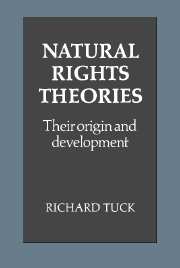Conclusion: ‘The History of Morality’
Published online by Cambridge University Press: 05 June 2012
Summary
At about the time that the heroic period of the new theory of natural rights was drawing to a close, its exponents began the attempt to locate it in an historical context and to assess the different part played by its various architects. Their activity led to the formation of a new genre, the History of Morality, which was to be eminently characteristic of the early Enlightenment. The first person to write such a history of the new school was Pufendorf himself, as early as 1678; he was followed by (among others) the author of probably the best example of the genre, Jean Bar-beyrac, in 1706, by J. F. Buddeus in 1711, and by Christian Thomasius in 1719. It was their view of their own intellectual ancestry that was to be the main influence in shaping the eighteenth century's interpretation of the whole movement. On the whole, all these authors had a clear and consistent picture of this history.
Barbeyrac's Historical and Critical Account of the Science of Morality is a good example: he argued that among the philosophers of the ancient world, only the Stoics had come anywhere near to giving an adequate account of man's moral life.
- Type
- Chapter
- Information
- Natural Rights TheoriesTheir Origin and Development, pp. 174 - 178Publisher: Cambridge University PressPrint publication year: 1979



